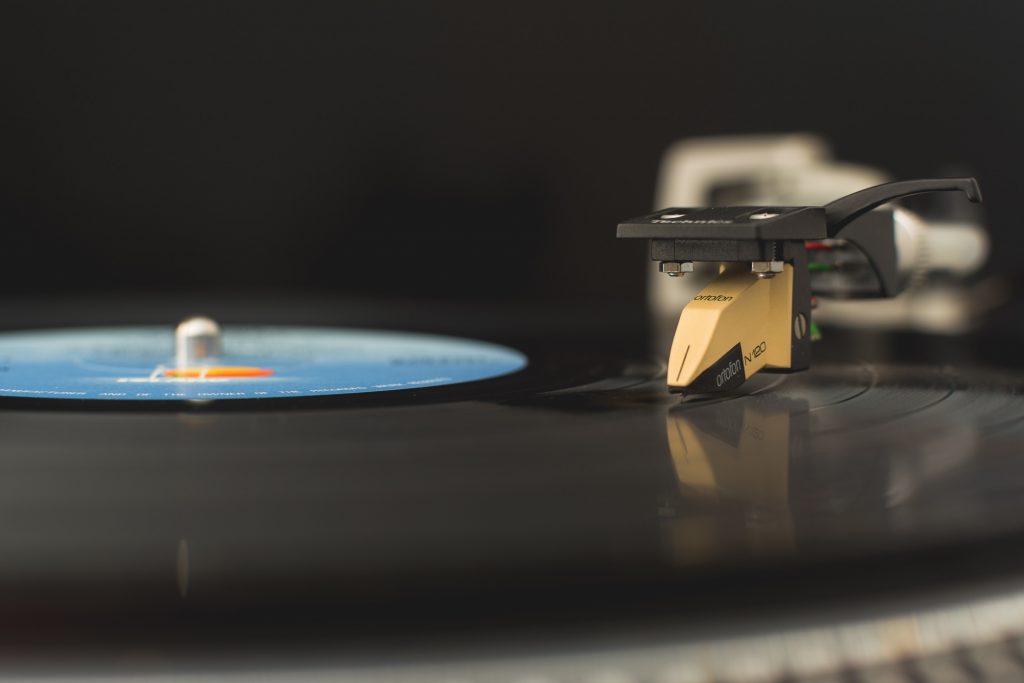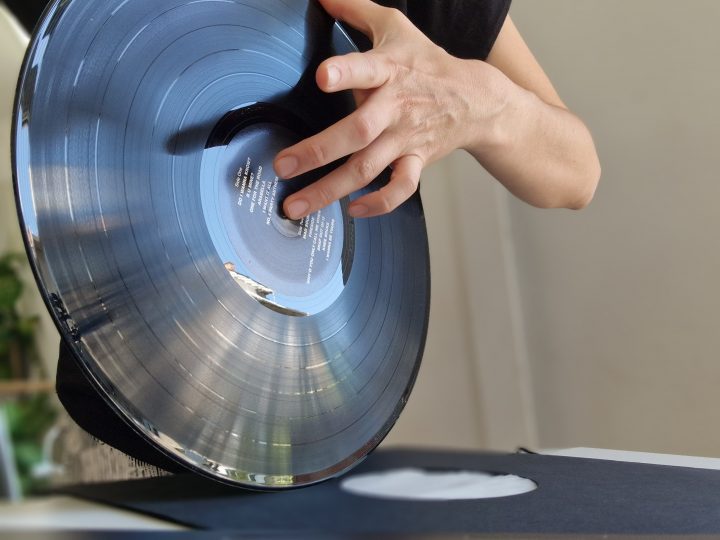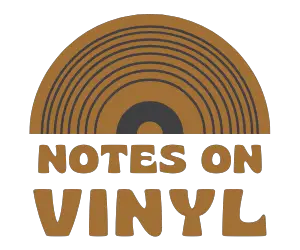So, are you just starting out in your record collecting journey and are thus looking to get your head around some of the key terms so you can discuss these things with like-minded enthusiasts online? Or, perhaps you are a more seasoned collector and still have not managed to quite get your head around one of the main linguistic quandary’s of the entire record collecting subculture?
Whatever your reason for being here today, you are more than welcome to be here alongside us as we explore and elucidate for you the central differences between the terms LP vs vinyl: from whence their linguistic roots come and how they have come to be misconstrued as the same thing.
So, vinyl vs LP are they the same?
LP means Long Play and it refers to a full-length record.
Vinyl is used nowadays as a synonym for record or album.
LP technically refers to the length of a record. Vinyl refers to the actual medium of the record.
Table of Contents
- What Are Vinyl Records?
- What Are LPs?
- How Long is an LP?
- LP vs Vinyl: Is LP and Vinyl the Same?
- Final Tones
- FAQs LP vs Vinyl
What Are Vinyl Records?
Vinyl records are a form of physical sound storage medium, an analog technology that was the primary medium for consumer music reproduction from the early 20th century until the late 1980s, when digital formats such as CDs began to dominate. They are also known as phonograph records, or simply records.
A vinyl record is a flat disc made of polyvinyl chloride plastic (hence the name “vinyl”), with a modulated spiral groove running from the periphery to near the center of the disc. The groove starts on the outside and ends near the center of the disc. Sound is recorded and played back by a needle or stylus that vibrates as it follows this groove. The vibrations are then converted into sound waves, which are amplified and played through speakers.

Considering the questionable source of the main ingredient, it is a miracle that records are still made. They are outdated and antiquated in more ways than just their tandem with modern technology: they are frankly a menace to the environment, founded upon the tall gushing towers of crude oil that still make the world go round.
And yet they are, and we are here, both talking about and fawning over them, or at the very least trying to understand them better, in particular, today the difference between LP vs vinyl.
What Are LPs?
On the supposed inverse, the term LP has come to be synonymous with precisely the same thing as vinyl, despite them both at root referring to different things entirely, each with a separate linguistic and epistemological origin. Since we have already covered the latter, we must duly do the same with the former.
LP stands for Long Play and comes from a time when the record was beginning to take off worldwide and showed signs of being the go-to format throughout the western world.
The original record that came closest to looking as ours does now was the 10-inch acetate disc, a direct precursor to the modern record, which was intended to be played at 78 rpm (a number devised by gramophone inventor Emile Berliner as being the best for audio fidelity). This obviously did not leave much space, so recorded music was for a time shorter.
When the 12-inch record type came about on the more durable polyvinyl chloride, they had come to be played at 33 1 / 3 rpm, and therefore more music could be fitted onto the disc.
This was their primary selling point, one that Columbia Records made good to boast about when they claimed that the sides were large enough to accommodate for whole movements of classical music. The Long Play was born.

How Long is an LP?
An LP, or long-playing record, typically has a total playing time of up to about 45 minutes, with about 22 minutes per side on a 12-inch vinyl record played at 33 1/3 revolutions per minute (RPM). However, the exact duration can vary based on the specific record. Some LPs might have slightly shorter or longer playing times depending on the amount of music and the recording’s mastering process.
LP vs Vinyl: Is LP and Vinyl the Same?
We must work step wise if we are to understand the differences between LP vs vinyl as ways to refer to those frisbee like discs we so love.
In this context, it is more than likely that a record collector when using the term vinyl is referring to the entire medium (including the plastic from how are vinyl records made – polyvinyl chloride), or in particular the discs themselves.
As already alluded to, the reason they are called vinyl is because of the polyvinyl chloride from which they are made – a crude oil alloy of plastics fashioned into the famous and unmistakable disc shape.
Similarly, the term vinyl can also come to refer to the sleeves of the records, though they are more broadly captured under the umbrella of the word ‘record’.
Most interesting, perhaps, is the way that the term vinyl has become so synonymous with vinyl records, even despite the substance polyvinyl chloride from which it is made being used to create a whole host of other different things. It is so synonymous that even the mere mention of the term will almost certainly conjure up an immediate image of those familiar discs.
So, where the term vinyl refers at root to the material from which the records are made, the term LP comes from the inception of arguably the most famous kind of record, the 12-inch, bringing about a metric revolution of Long Playing records. Since these are often the most common form of record, in times past and present, it is not hard to see how LP vs Vinyl as a dichotomy has come to be construed as more of a symbiosis.
Final Tones
So, there you have it! Hopefully, you are now feeling far better equipped to discuss the various minutiae of record collecting with other like-minded enthusiasts of the medium. Or, maybe the unbearable itch of what exactly the difference between LP vs vinyl has been scratched for you.
No matter what, keep on spinning and stay curious!
FAQs LP vs Vinyl
Does LP stand for vinyl?
Not technically, though they have both come to be synonymous with each other. The term vinyl refers at root to the material from which records are made – polyvinyl chloride (a crude oil plastic shaped into discs). Inversely, the term LP comes from the inception of the 12 inch record, which, in contrast to earlier 10 inch discs played at 78 rpm, were to be played more often at 33 1 / 3 rpm, meaning Longer Playing time overall.
Why are vinyl records called LP?
The term LP comes from the inception of the 12 inch record, which, in contrast to earlier 10 inch discs played at 78 rpm, were to be played more often at 33 1 / 3 rpm, meaning Longer Playing time overall. The term more strictly refers to an album, for those would be the kinds of releases intending for the Long Play 12 inch record to be spun at 33 1 / 3 rpm.
Can you play an LP on a record player?
Indeed, in fact this is exactly what they are intended for. With any kind of hobby like this, there is no doubt going to be some linguistic confusion, especially in the case of record collecting, where the trends of yesteryear are being revitalised within a dramatically context and thus by a different audience. LP stands for Long Play, and refers to the length of time a 12 inch record played at 33 1 / 3 rpm can offer when thinking about pressing a release to vinyl. Older types of disc like 10 inch acetates played at 78 rpm for example, would have offered very little by comparison.
What does 2 LP mean on vinyl?
If we are to take the term LP within the context of record collecting to stand for Long Play, then I imagine anyone reading would be able to quickly deduce that 2 LP, in the very same context, means that the release is to be pressed onto two discs. This is either because the release is longer in the first place, or because the release has been mastered at a slower speed to allow for more details and nuances in the overall production and output of the sound.





